Once again Sheffield PSC brings you an amazing calendar to adorn your wall for the whole of 2019, at the bargain price of £5 plus £1.20 postage.
Get them by emailing enquiries@sheffieldpsc.org.uk
Once again Sheffield PSC brings you an amazing calendar to adorn your wall for the whole of 2019, at the bargain price of £5 plus £1.20 postage.
Get them by emailing enquiries@sheffieldpsc.org.uk
 The International Women’s Day event this year was entitled: ‘Women of Palestine: the ongoing Nakba‘
The International Women’s Day event this year was entitled: ‘Women of Palestine: the ongoing Nakba‘
2018 is the 70th anniversary of the Palestinian Nakba, the process of ethnic cleansing and colonisation that continues to this day, so the choice of theme for our events this year was obvious.
A photographic exhibition displayed remarkable UNRWA archive images from the Nakba and Naksa. These images were accompanied by modern-day photos to bring the story up-to-date as well as a film and other media about how these events affected a family from Aida Camp.
You can find the full report and more images here
You will be able to see the photos from this exhibition in the Meersbrook Park Walled Garden on June 16th and June 17th. Please see here for times
The Israeli policy of erasing memory is cutural as well as physical. Aside from
the Nakba law, deprives Israeli public institutions, including schools, universities and libraries, of funding should they mark the Nakba, and is aimed at erasing memory.
70 years from the Nakba, let’s defy Ben Gurion’s prediction that while many have died, those alive will not forget.
On 22nd February we will welcome Dr Mona Al Fara from the Middle East Children’s Alliance to Sheffield.
Dr Al Fara will talk about the desperate need to help children in Gaza traumatised by war, and siege and seeing their parents and wider families devastated by Israeli aggression.
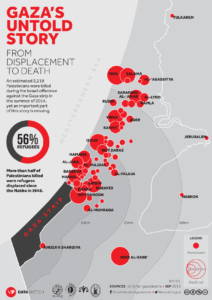 Additionally, 11,000 were injured, one third with permanent disabilities and more than 18,000 Palestinian homes were destroyed. Israel’s siege and the periodic bombardments of Gaza have prevented people rebuilding their lives. Many still live in tents and makeshift homes. Water and electricity are still only available for a few hours a day. For schools, hospitals, workshops, farms and homes to be restored Palestinians need international solidarity.
Additionally, 11,000 were injured, one third with permanent disabilities and more than 18,000 Palestinian homes were destroyed. Israel’s siege and the periodic bombardments of Gaza have prevented people rebuilding their lives. Many still live in tents and makeshift homes. Water and electricity are still only available for a few hours a day. For schools, hospitals, workshops, farms and homes to be restored Palestinians need international solidarity. These accounts were corroborated by the Israeli human rights organisation, B’Tselem. Khuza’a was one of the three areas that suffered particularly badly during the 2014 Israeli attack on the
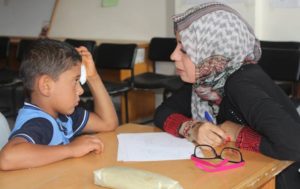
Gaza Strip. Hundreds of its civilians were killed and large areas of the town were wiped out. Some residents were used as human shields by the invading Israeli army. As a result, thousands of children are still traumatised and in need of psychological help.
Keeping our spaces inhabitable for future generations is a problem world wide. For Palestine and Palestinians, the devastating impacts of occupation is no better demonstrated than with the imperilled state of the water supply in Gaza.
All this and more is fantastically demonstrated in our new calendar pictures from Gaza and infographics from Visualizing Palestine
How to get the calendars
Cost:
To mark Sheffield Palestine Women’s Scholarship Fund 10th Anniversary, we are holding a celebration event on International Women’s Day, March 8th 2017 in Sheffield Town Hall at 7pm.
Full information here: International Womens Day Event
Hosted by the Lord Mayor, Denise Fox, with songs from Sheffield Socialist Choir, stories from our scholarship students, speeches from Sheffield PSC activist Musheir El Farra and Palestinian woman speaker Kholoud Al Ajarma on the power of women’s education.
All welcome to celebrate how Sheffield has shown its solidarity with Palestinian women students in Gaza, Palestine.
Event is part of SheFest
Sheffield’s cinema Palestino film season has been a fixture for 8 years now. This year we are showing 3000 Nights, an award winning film set in a Israeli women’s prison contratsing the britality of her treatment with the care given to new life and community
We are also showing a documentary by Hind Shoufani about her father, Elias Shoufani, academic, activist and exile. Winner of Best Non-European Documentary at the European Independent Film Festival, Paris this film is a personal, poetic and political archive and interview journey to discover family history.
More about these films is here;
Deputy Mayor, Anne Murphy, welcomes the Lajee dancers to Sheffield. Later enjoying pizzza in Endlciffe park.
More photos here
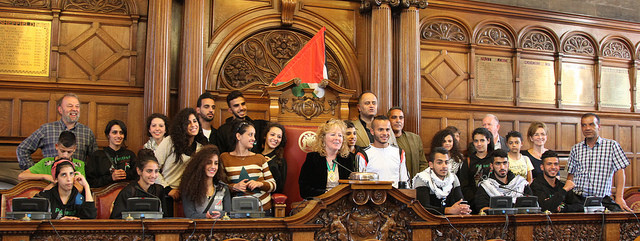
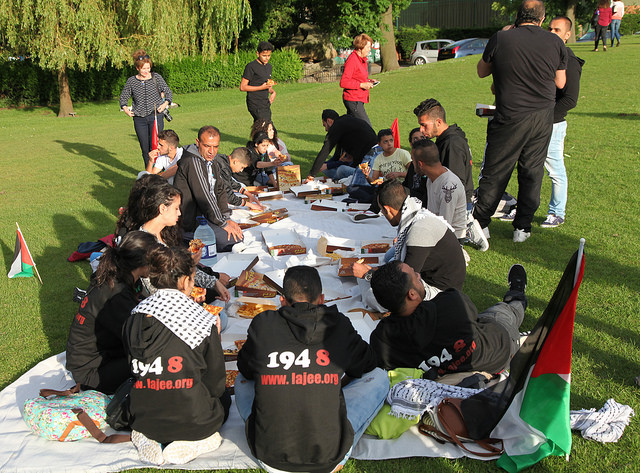
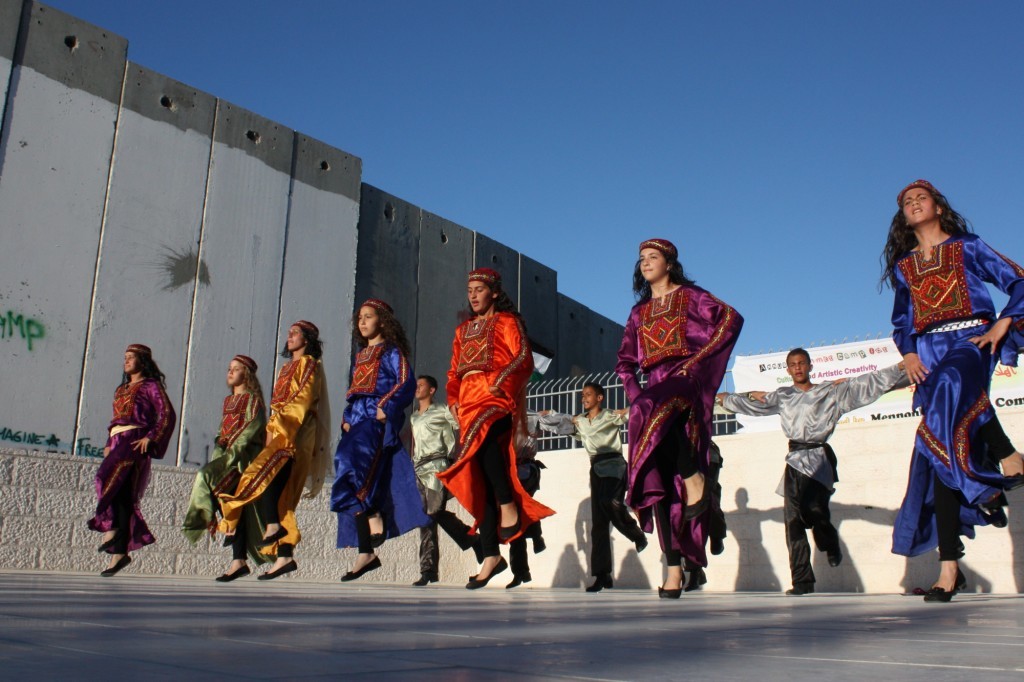
What better image can there be of cultural resistance to occupation than dancing under the separation wall. In spite of the occupation, destruction of civil life and countless barriers to cultural engagement, Palestine, Palestinians and their culture does not go away, or become invisible.
Please give these young peole the warmest possible welcome to Sheffield and see the Lajee dancers next Saturday